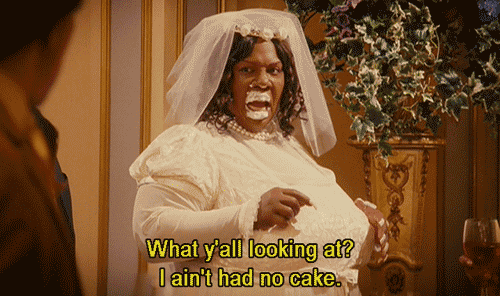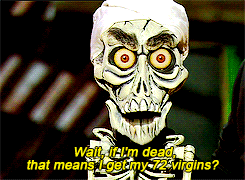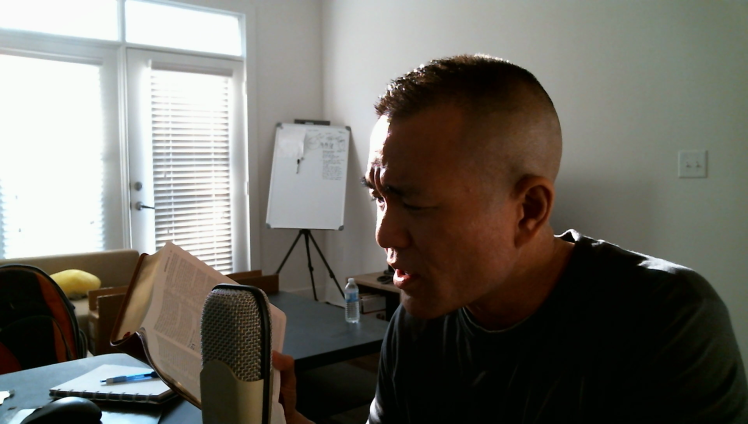During the heights of my “Abyss” period about 7 years ago, I would be spend a lot of time on the internet. Social media and YouTube were my windows to the world since I was too sick to engage with the outside world in person. In my sickness, I would be like a sponge, trying to soak up any or every idea that just might help me, even if it were just a little help. After all, I still had no solution to my obvious decline in everything, so anything that might help was welcome.
I started to realize just how liberal and postmodern today’s culture is. Hollywood, media and higher academia is dominated by such thought. Most of the time, my mind was more preoccupied about survival and understandably numb to the societal effects of this pervasive ideology. But during brief spaces of uncommon relief, my intellect quickly kicked in and realized that this liberal postmodern culture is not just pervasive – they are pernicious.
My heart breaks when I see young people who are feeling empty and are looking for guidance being influenced by this culture. Some of these young people, when they temporarily forget the saccharine hype of liberal postmodern culture actively pushed by Hollywood and many institutions of higher learning that trickles into social media and reflect deep in their souls, they sense an emptiness. A despair. They feel they could be much more. No, they feel they should be someone else. In this suggestive state, they peer around looking for answers.
To the question of “how can I make it?” Or, “how do I overcome my emptiness?”, I have heard many times from celebrities, to even the young guy that has no accomplishments to his name, two statements. They are repeated ad nauseum. I’m so sure that you’ve heard them as well.
- Don’t compare with the rest, be the best version of yourself! Don’t let anyone tell you you’re doing it wrong.
- Just believe in yourself.
No wonder psychiatrist Dr Keith Ablow opines that “we are raising a generation of deluded narcissists.”

Is this really true? Perhaps.
But this is not the real elephant in the room. My elephant gun is not targeted at millennials, so rest easy!
The huffalump hiding in plain sight is the postmodern climate that increasingly declares that there is no objective truth combined with an explosion of unfiltered media and communication onslaught. There are so many truth claims being fired from every direction that they mere vast number of them over-saturates us. How can there be one truth if there are so many truth claims? Worse still, real deep truths cannot be properly formulated with soundbites. But in today’s media, soundbites win out. To subvert us, it is easy. Simply mix in quick hitting entertainment, and add in your soundbites or show how cool postmodernism is. The soundbites added in is simply the ideologies of people who have the most money to sway our programming. It’s war, actually. War on our hearts and minds.
This postmodern spirit, is this really something new under the sun?
Actually, God had already inspired Paul to write about this. As I read 2 Timothy 3 again, I sometimes get speechless how spot on this is.
In 2 Tim 3:1-5, Paul wrote that in the last days, people would be “lovers of themselves”, “without self-control”, “having a form of godliness, but denying it’s power”, “always learning but never able to come to the knowledge of the truth”. Danial 12:4 continues inform us that in the last days the magnitude of “knowledge shall increase.”
Woah. Doesn’t this describe the main complaints about the general direction the Millennials are taking in the age of the internet? As mentioned before, Psychiatrist Dr Keith Ablow opines that “we are raising a generation of deluded narcissists.” Even the The Huffington Post concludes that U.S. colleges students now “feel super special about themselves.” Millennial Alexis Bloomer opined in her viral video, that her generation feels “the great extent of existing but not adding value.” “They feel the greater need to cuss to prove a point.” “They feel education and a good job is an entitlement.” Bruce A. Ritter opines that, “Millennials come to expect receiving what they want – and they want it now!” They also have strengths like high rates of volunteerism. They are experts at multitasking. They are social, having learnt from childhood to be inclusive, to leave “no child left behind.” Millennials have been raised to be tolerant – of race, religion, even sexual orientation; they were taught “don’t judge.” (1) “But parents and mentors failed to teach them the importance of exercising patience, discretion, prudence. They were not taught to value right from wrong, to understand the difference between one from the other.”
This is the heart of post-modernism, that there is no truth beyond the truth that we as individuals make. In today’s climate, we live in sad contradiction. We are supposed to make our own goal posts, yet we feel pressured when others excel further than us. We are supposed to celebrate “doing things our own way” and “being ourselves”, until you step on some others who are also “being themselves”. As they say, today’s diplomacy is giving you permission to do things my way. But making men, including one’s self, the ultimate authority for truth and reality has always been a bad idea. Which world dictator do you know, Stalin, Hitler, Mao, the Kim Jungs, who was able to craft their own reality as truth through absolute power actually turned out to be a net positive to mankind? (Incidentally, all accumulated riches and power while their ideologies were steeped towards Darwinism and Socialism – men were only as special as the material benefits that the dictators thought they offered the country) Ironically, all of these dictators would argue that they have achieved the best version of themselves, so who are we to judge?
Yes, I can hear …

—
Back to the vapid mantras being preached to our young by the church of bright lights and liberal postmodernism. 1) Don’t compare with the rest, be the best version of yourself! Don’t let anyone tell you you’re doing it wrong. 2) Just believe in yourself.
I know you’ve heard this for the nth time. As a person who has gone through extraordinarily tough times with no human solutions and have actually been at rock-bottom, I can tell you these statements, just like many others in the positivity movements, are akin to a bag of farts that had cologne sprayed on the outside. It seems good on the outside, but if you stick your nose deep into it and take a serious whiff, it smells rotten and has no substance to it. What good is it to be the best version of yourself when everyone can define what “yourself” is? What good is believing in ourselves when obviously there is something wrong with us in the first place, else why would we be feeling that emptiness or sense of failure?
“Let them have cake”
– commonly misattributed to Marie Antoinette
These faux platitudes give a form of an answer but they don’t really answer anything. Not only do they promote the breeding of a generation of narcissists that are out of touch with reality. When society lionizes Caitlyn Jenner (biological male and formally Olympic star Bruce Jenner) for stepping out and indulging his desires as a woman yet soldiers in the military who have sacrificed themselves for others get 1/100th of the attention and celebration; when after obvious Islamic terrorist attacks occur, the hard questions like which religious doctrines that the terrorist subscribed to are ignored, while even agnostic teens that don’t even bother about praying are putting up hashtags of #prayforparis before they totally go back to their lives; then something is amiss. The scholars who send hours parsing through religious texts and terrorist manifestos trying to find real answers are labelled as intolerant, but people who are simply doing nothing but virtue-signaling that we should all love each other are labelled the feel-good heroes. When these things happen you know this is an case of out-of-touch reality syndrome of the Marie Antoinette magnitude. Evil does exist, and evil thrives when good people do nothing. Believing it’s all about yourself shackles us into doing nothing, and instead of focusing on our service for others, we are told focus on who can self-express themselves more.
“Let them eat cake” is the traditional translation of the French phrase “Qu’ils mangent de la brioche”, supposedly spoken by “a great princess” upon learning that the peasants had no bread. Since brioche was a luxury bread enriched with butter and eggs, the quote would reflect the princess’s disregard for the peasants, or her poor understanding of their situation. (2)
This description is so apt.
Even worse, believing faux solutions might prevent us from finding the real guidance to things we were meant to do, and who we were meant to be. Today, people want to look virtuous but are not willing to put in the time and dedication for real self-reflection in order that they may find a true cause higher than themselves that they are willing to sacrifice for. They want to add causes to their resumes so that they can be worshiped, rather then dedicating their lives to cause itself. This is like wanting to take the cake, eating it as well as deliver the calories to the next person while getting others to pay for it.

Thought 1: This emptiness has been there since the dawn of man. If we were the solution on this problem, it would have been solved centuries ago.
This emptiness. This silent desperation. In fact, all of us have felt this, from the spiritualist Thoreau to atheist Bertrand Russell. The intellectual transdentalist Henry David Thoreau (12 July 1817 – 6 May 1862) describes the feeling in his book Waldon, that “the mass of men lead lives of quiet desperation.” In his book, Free Man’s Worship, the atheist Bertrand Russell’s (18 May 1872 – 2 Feb 1970) attempts to describe the emptiness sounds more notably worse. If Thoreau’s prognosis was grim, Russell’s was the reaper. He wonders why men have this insatiable need to achieve something significant, and yet if men are simply made out random mindless particles, then they are ultimately purposeless and simply powerless in the vast universe. Russell askes the question, “How in such an alien and inhuman world, so powerless a creature as man preserve his aspirations untarnished?” Knowing that this question has no answer, it yields to feelings of “unyielding despair”. Both recognize an emptiness, a void; but why is Thoreau’s observation more muted? To me, this is just more affirmation that this hole is indeed a God-shaped hole. Thoreau is more hopeful because he accepts God exists and hence the hole can be filled, at least partially if not full; but to Russell, who does not believe in God, the hole can never be filled – leading to fatalism. What good is showing people all your faux achievements and images of how celebrated you were on social media “when in the end”, as Linkin Park would say, “it doesn’t even matter”. Even if people feel for you, even that is romantic nonsense, since all your own memories will be erased as you return back to the dust in which we came.

“What else does this craving, and this helplessness, proclaim but that there was once in man a true happiness, of which all that now remains is the empty print and trace? This he tries in vain to fill with everything around him, seeking in things that are not there the help he cannot find in those that are, though none can help, since this infinite abyss can be filled only with an infinite and immutable object; in other words by God himself”
Blaise Pascal, Pensees (New York; Penguin Books, 1966), page 75.
What these young chaps are feeling is this God-shaped hole in our hearts, but what liberal postmodern culture does is to presuppose that we ourselves are the solution to that hole that is innate part of ourselves.
“Pay no attention to the man behind the curtain” – Wizard of Oz
Both Thoreau and Russell admit there is a problem but today’s vapid ethos is more like, “What problem? You already are the solution.” It is a combination of 1) sticking your head into the ground to deny there is a fundamental deep seated problem, and even if you suspect point 1 is baloney then 2) fake it until you make it. If you look the part, today’s culture tells you, you are the part. The ethos may go something like this: Secure, fruitful and determined people seem to be happy, be surrounded by friends and family that respect them, and are celebrated by the world; so just work at getting the appearance of those things and post them on social media, over time you will likely feel secure. Does your head hurt yet just thinking about it? “Pay no attention to the man behind the curtain”, said the diminutive Wizard of Oz, asking the protagonists to keep focusing in awe of the powerful but fake self-image generated with smoke and mirrors they stole a peek behind the curtain.
Why project more fake to hide the fake? Why not just find the real?
(The Bible calls this real “Shalom,” by the way; it’s a peace, fruitfulness and security in all categories of life from material provision to blessings of a loving family that comes with being right with God)
This is where the Christian doctrine is so unique in this history of the world. It claims the more you look to yourself as the solution to the God-shaped hole, the more disappointed you are going to be.
Thought 2: The reason why we are not the solution to the God-shaped hole is that nothing good comes from our flesh.
Yup.
Let this sink in. Nothing good comes from our flesh. Nothing.

There is a part of us that can do good, but unfortunately, the flesh dominates long term so long as we are without God and on earth. That’s I know that “we” can do our own short term solutions, but never the long term. With enough willpower, we can muster up the courage of a lion, the nobility of a king, the heart of a servant, by ourselves. But just like swimming upstream, once we are too tired, it only goes downhill without external help, such is the bane of having “the flesh”. This is the reason why the first two steps of the recovery from addiction of the very successful Alcoholics Anonymous programme, which was started by a Christian, are 1) We admitted we were powerless over our addiction, that our lives had become unmanageable and 2) We came to believe that a Power greater than ourselves could restore us to sanity.
Paul makes it abundantly clear that though we were purposed by God to be perfect we became fallen creatures due to sin that came with the fall. This is why we had a notion of what perfection looks like, but our nature is corrupted with sin so we will always have that sinful bent. The Bible calls this bent, “the flesh”. The rest of the world also has this sinful bent. And, nothing good comes from this flesh. (Romans 7:18-25)
I know that nothing good lives in me, that is, in my flesh; for I have the desire to do what is good, but I cannot carry it out. For I do not do the good I want to do. Instead, I keep on doing the evil I do not want to do. And if I do what I do not want, it is no longer I who do it, but it is sin living in me that does it.
Romans 7:18-20
This is such a diametrically opposed idea to what is popular in culture today.
Today’s culture: Who cares if you were created or not? You are perfect the way you are now. You quiet desperation is a delusion, ignore it. Just go with your feelings, don’t compare yourself with history. You are a little god, we all are. All your pursuits are as noble and should be celebrated just like everyone else’s.
God’s truth: You are created by the Creator. You are not perfect. Your God-shaped hole is real, it should lead you to seek God. You need the purpose-giver to reveal your purpose. We need to receive God’s grace through the gift of Jesus’s death on the cross to pay the price for the sins of the world, reversing the curse and actualizing your true purpose on heaven and earth.
The empirical evidence shows that we have an idea of what is good, but we are prone to do selfish things that when taken to extremes, are evil things.
Today’s culture says that the mixed bag is totally you, it shouldn’t be fundamentally changed and should be celebrated; we don’t need to look deep as to why we are the way we are. On the other hand, The Bible gives us the reasons why we exhibit such behavior. Romans 7 tells us a very different picture, and, it actually steps on our toes and dares to tell us we need to be fixed.
So I find this law at work: Although I want to do good, evil is right there with me. For in my inner being I delight in God’s law; but I see another law at work in me, waging war against the law of my mind and making me a prisoner of the law of sin at work within me. What a wretched man I am! Who will rescue me from this body that is subject to death? Thanks be to God, who delivers me through Jesus Christ our Lord!
Romans 7:21-25
Through Jesus Christ is my deliverance? The profundity in the simplicity of this statement cannot be understated.
Thought 3: The completion of kingly destinies and being right with God starts with Christ Jesus.
The Bible says that there are two Laws working within us. An inner being that delights in God’s Law, and the law of sin that causes us to predictably fall away. The conflict within us is supposed to lead us to search for God, because we know we are not supposed to be like this, so that we can be made whole – it can’t be more opposite to today’s culture that tells us that there is nothing wrong with us. Today’s culture tells us we must love ourselves, and celebrate the light and the darkness within. Correction. Today’s culture denies there is a light or a dark, for both is simply you; and everybody is uniquely them – hence we might tweek our behavior here and there, but it denies there is anything fundamentally wrong with us… there is nothing in our nature to change. Today’s culture claims that all of us are good, and mass-killings are only due to the mentally unstable, but the Bible tells us how it is, that we are hopelessly a slave to sin and that God loves us too much to allow us to stay the same. He has given the solution – in the person of Jesus Christ.
I will unpack this grace in the coming posts.
Today’s culture’s solution is so diametrically different from the God’s wisdom of ages ago. Either one is right and the other is not. How can two established solutions be so totally different, unless one was intended to harm us. This begs for serious consideration. For if the Bible is true, that depending on yourself or the world for your “salvation” is indeed a frightening proposition because it will actually make the problem worse. If that God shaped hole was a fire that needed to be put out, then “just believe in yourself” is not water, it is oil. It is akin to a cocaine addict getting his next hit. The hit feels like he got what he needed, but when the temporary effects have abated, the problem is worse than before. If today’s liberalism is true, then we are abusing and hating ourselves by trying to change parts of our nature.
But who cares? The people of today might think “just believing in yourself” sounds so … good? That tagline sounds like a remedy to life as well as a pat on the shoulder at the same time. But remember, the most dangerous things to us don’t look dangerous. If ISIS terrorists pasted ISIS on their foreheads, they would never get close enough to do great amounts of damage. If poison tasted bitter, you wouldn’t drink much because the bitterness would cause you to spit it out quickly. But if poison was mixed into something sweet and sugary, you might continue to consume it over long periods of time, not realizing that you are in fact dying slowly. If there indeed is a devil, that the Bible calls “the prince of this world”, he would be working through deception in order to kill your soul slowly. The notion there is nothing wrong with you, and that the outgrowth of your own potential will solve what your soul is desperately warning you about is too seductive.

If only all terrorists looked like this, we could spot them a mile away.
Thought 4: This silent desperation we feel is not evolutionary residual nonsense, it was innately built in us by our Creator to that we might search for Him. Act on it, and you might find comfort, ignore it and you definitely won’t.
Yet, the Bible does say that even without reading the Bible, we already have enough to know God is present. Is this silent desperation we feel something the creator designed for us to lead us to find Him? Or is it just a residual useless tendency left behind after our “random evolution”? It didn’t take too long for me to realize it’s definitely not the latter, for if this sinking feeling is a residual tendency based on randomness and should be ignored to better flourish, how is it that everyone on earth feels this way? Natural selection would deem this feeling useless and we would be selected out of it.
Doesn’t it just seem fitting for a Creator to leave something seemingly innocuous behind so that we may have the quest to find Him, and to find ourselves? Doesn’t it make sense that people who want to think themselves as their own god would find ways to reason it away, for embarking on a quest to see where the trail ends up is too frightening for them.
There is great dignity in the search. That search was designed by the King of the universe for the kings who are trying to find their crowns.
It is the glory of God to conceal a matter,
But the glory of kings is to search out a matter.
As the heavens for height and the earth for depth,
So the heart of kings is unsearchable.
Proverb 25:2-3
Even more encouraging, is the promise that,
You will seek Me and find Me when you search for Me with all your heart. ‘I will be found by you,’ declares the LORD
Jer 29:13-14
This is the reason why CS Lewis tells us to continue searching for Truth, even the truths that seem unpleasant at first. No one wants to admit they have a big problem, and that they are not the true stewards of their destinies. No one wants to admit that they could be nothing compared to the vastness of the universe. But if we risk the search in our darkness and find the savior in Christ, it will be all worthwhile.
“In religion, as in war and everything else, comfort is the one thing you cannot get by looking for it. If you look for truth, you may find comfort in the end: if you look for comfort you will not get either comfort or truth — only soft soap and wishful thinking to begin with and, in the end, despair.” ― C.S. Lewis, Mere Christianity
To conclude, here are the 4 thoughts:
Thought 1: This emptiness has been there since the dawn of man. If we were the solution on this problem, it would have been solved centuries ago.
Thought 2: The reason why we are not the solution to the God-shaped hole is that nothing good comes from our flesh.
Thought 3: The completion of kingly destinies and being right with God starts with Christ Jesus.
Thought 4: This silent desperation we feel is not evolutionary residual nonsense, it was innately built in us by our Creator to that we might search for Him. Act on it, and you might find comfort, ignore it and you definitely won’t.
In the next couple posts, we will explore more on how the postmodern solution for our emptiness is contradictory, as well as how the Bible shows us the different forces at play that explain how we are. We will talk about the How Christ is the solution, the Flesh, the Self-Directed Life, and the Christ-Directed Life.
DON’T forget to follow this blog through e-mail! You can find the option on the top right of the post. 🙂
Stay tuned. Be well. End of Part 1.

Well reasoned Kenneth! You may wish to incorporate The Kenosis Principle by Paul in Philippians 2…
Shalom n prayers as always.
LikeLiked by 1 person
Thank you! I’ll definitely try to find a way to get that in the book itself.
LikeLike
It’s Reformation Sunday, and my church was talking about GRACE. I think a lot of our self confidence is defined as the difference between where our narrative is today and where we want it to be.
On the positive side, that is the engine of human progress. On the negative side, we’re chasing after a moving goal post half the time because the definition of “best” from “best version of yourself” keeps evolving. No matter what, One day we will all be accountable to God on this narrative – how we lived our lives, how we prioritized our resources (time, money, energy, field of influence etc.) just as the servants tending to the field answer their master.
Moreover we are accountable for what’s in the heart. It’s hard to draw the line – we will be quick to condemn the person whose face was a wreck after too many cosmetic surgeries when she could have given all that money to charity. What about the person who bought a particular phone which takes better selfies? Or the middle aged person who took a trip to the aesthetic clinic? Or a parent who bought designer clothes for their babies and went to a photo studio to get their shots taken? Or simply that person who took an extra 15 minutes to dress up for church on Sunday?
Truth is, we’re all benchmarking to the norm. And that norm and hence what the “better version of yourself” is shifting. Yesterday I was having this conversation with a friend who said “it’s impossible to have this super ambitious career and also be an extremely dedicated mother who is always with her kids (and I would add, looking like a model with perfect skin and hair and body that defies all time lines).”
Something has to give as we optimize. The Lord gave us land with different talents, not an infinite football field. And we are so dependent on Him to write this narrative with us. I don’t know where I would be without HIM.
LikeLiked by 1 person